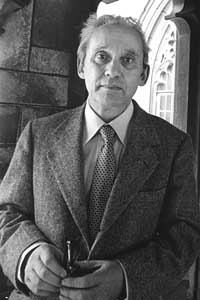Professor Emeritus Ricoeur, former professor Pelikan share Kluge Prize for human sciences
By Jennifer CarnigNews Office
 Paul Ricoeur, the John Nuveen Professor Emeritus in the Divinity School | |
Two scholars with strong ties to the University have been awarded the John W. Kluge Prize for Lifetime Achievement in the Human Sciences, an honor sometimes called “the Nobel Prize for the humanities,” which carries with it the same monetary award—$1 million.
The winners of the Library of Congress’ lifetime achievement award are Paul Ricoeur, the John Nuveen Professor Emeritus in the Divinity School and one of the world’s leading philosophers, and Jaroslav Pelikan, a former Divinity School professor and religious historian who earned his Ph.D. from Chicago in 1946.
The award, which will be presented Wednesday, Dec. 8, during a ceremony at the Library of Congress, recognizes work in anthropology, philosophy, history and the study of religion, for which there are no Nobel prizes. Ricoeur and Pelikan will share the honor and its monetary prize.
Perhaps best known for his contributions to the development of hermeneutics, the study of the interpretation of texts, French philosopher Ricoeur has written more than a dozen books and hundreds of articles. Now 91, Ricoeur held the chair of general philosophy at the Sorbonne during the 1960s. After being presented with an honorary Ph.D. in Divinity by the University in 1967, Ricoeur joined the Chicago faculty of the Divinity School in 1971, where he taught until his retirement in 1991.
During his years on the faculty, he wrote extensively, publishing a number of important books, including The Living Metaphor (1975), Time and Narrative (three volumes, 1983 to 1985), and Oneself as Another (1990).
Ricoeur’s colleague Don Browning, Professor Emeritus in the Divinity School, called Ricoeur “one of the truly great philosophers of the last 100 years. He has done much to restore the proper contributions of history and tradition to critical rationality. At the same time, he has done this in such a way as to retain a place for science and the criticism of tradition. He has enabled us to retain tradition without lapsing into ideology, conservatism and traditionalism.
“Scholars from a broad range of the humanities are actively studying and using his seminal thought in philosophy, philosophy of religion, moral philosophy, and the theory of language, symbol and metaphor,” Browning added.
Upon his return in 1991 to France, where he still lives, Ricoeur continued to write crucial studies, extending his concerns into the fields of justice and law (The Just, 1995), neuroscience (What Makes Us Think, 1998), and the study of time (On Memory, History and Forgetting, 2000).
In a statement, Librarian of Congress James Billington said that Ricoeur “draws on the entire tradition of Western philosophy to explore and explain common problems: What is a self? How is memory used and abused? What is the nature of responsibility? He is a constant questioner—always pressing to understand the nature and limits of what constitutes our humanity.”
Pelikan received his doctorate from the University in 1946 and served as a Professor of Historical Theology at the Divinity School from 1953 to 1962. Now 80, Pelikan is celebrated for his work on the life of Martin Luther, both his own writing and his translation of Luther’s writings, Luther’s Works (22 volumes, 1955 to 1971), and The Christian Tradition: A History of the Development of Doctrine (five volumes, 1971 to 1989), which helped integrate the story of the Eastern Christian tradition into the overall history of Christianity.
“He is concerned with the history and practice of worship in its doctrinal and creedal forms over two millennia,” said Billington of Pelikan’s work.
Pelikan went to Yale University in 1962, where he taught until his retirement. He is now the scholarly director for the Institutions of Democracy Project at the Annenberg Foundation.
Billington called both Ricoeur and Pelikan “scholars of enormous and wide-ranging accomplishment.
“Ricoeur’s journey of interrogation through a wide variety of contemporary thought, and Pelikan’s journey through diverse linguistic frameworks and religious traditions represent the lifetime of achievement in the study of humanity that the Kluge Prize seeks to honor,” Billington added.
The award was conceived by Billington and financed by the philanthropist John Kluge, who contributed $73 million to the library in 2000. Last year’s recipient was the Polish philosopher Leszek Kolakowski.
![[Chronicle]](/images/sidebar_header_oct06.gif)